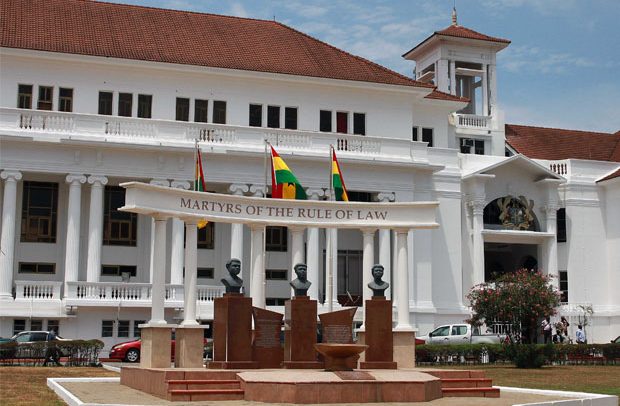The Supreme Court (SC) has adjourned its judgement on a case filed by IMANI Centre for Policy and Education, questioning the powers of the President to terminate the appointment of the heads of the uniformed security services.
The court had set May 7, 2025, to deliver its judgement on the matter which would have provided clarity on the powers of a new President to fire heads of uniformed security services and appoint their preferred replacements.
However, the court has adjourned the case indefinitely as the judgement of the court is not ready.
The court, on March 25, dismissed an application for injunction which sought to restrain President John Mahama from sacking Dr. George Akuffo Dampare as Ghana’s Inspector General of Police (IGP), describing it as moot.
According to the court, the application had been overtaken by events since the President had already announced a new IGP and heads of other uniformed security services.
A five-member panel of the court also disagreed with the applicants that the President’s decision to effect the changes while the application was pending was calculated to overreach the Supreme Court.
Suit
The writ filed jointly with Prof. Kwesi Aning, Director of Academic Affairs and Research at the Kofi Annan International Peacekeeping Training Centre, is questioning the President’s powers to terminate the appointment of the Chief Fire Officer of the Ghana National Fire Service; Inspector General of Police; Director General of Prisons Service and Comptroller General of Immigration Service.
The writ is seeking a declaration that upon a true and proper interpretation of the letter and spirit of Articles 200, 202(1), 202(2), 202(3), 205, 207 (1), 207(2), 207(3), 190(1), 191, 196, 199 and 296 of the 1992 Constitution of Ghana, the President has no authority to terminate the appointment or remove from office of a person occupying the office of these security agencies unless only upon proven stated misconduct or misbehaviour established against these office holders.
It is their case that the President can only terminate their appointment on grounds of incapacity to perform the functions of the office by reason of infirmity of mind or body or death or retirement or upon resignation by the office holder.
The plaintiffs aver that these security services are regimented services whose leadership must rise or be appointed from amongst the ranks, and therefore must be subject to the service conditions of the institutions they belong.
They contend that given the importance of these institutions and their effect on the security of the state, it was not intended for them to be removed at will by every President, as there are provisions which if read together show that these offices are protected from arbitrary disruption.
They further argue that the tenure of the heads of these security services is not linked to the President’s term, therefore, safeguarding them from arbitrary removal upon a change in political leadership.
It is their case that all Presidents under the Fourth Republic are guilty of “the impugned practice which, this honourable court, with utmost deference, must make a firm pronouncement.”
They add that in the face of the extreme politicisation of institutions of state, the public service remains that body of professionals appointed by the state to remain in office in order to ensure continuity in governance as postulated under chapter six of the 1992 Constitution.
The writ is therefore, seeking a consequential order to restrain or prevent the President of the Republic from dismissing or removing or attempting to dismiss or remove the appointment of persons occupying the offices of these aforementioned security services “unless only in cases of proven stated misconduct or misbehaviour established against such persons or upon retirement or resignation or death or incapacity to perform the functions of the office by reason of infirmity of body or mind.”
BY Gibril Abdul Razak


